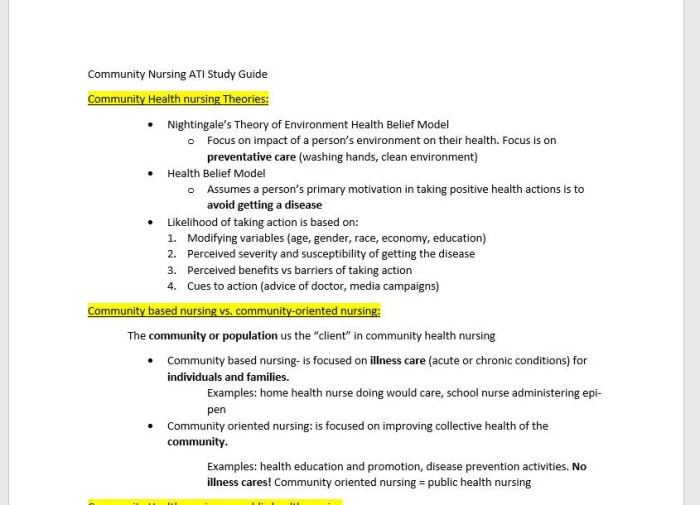Nursing Care of Children Final ATI provides a comprehensive overview of the unique challenges and considerations in providing nursing care to children. This guide explores the principles of planning and implementing nursing care, as well as the importance of collaboration and communication in delivering effective care to young patients.
Throughout this guide, we will delve into the assessment of the child’s health status, evaluation of nursing care, and ethical considerations in pediatric nursing. By understanding the complexities of nursing care for children, nurses can provide the highest quality of care to their young patients and their families.
Introduction
Nursing care for children is a specialized field that requires nurses to have a deep understanding of the unique physical, emotional, and developmental needs of children. Providing high-quality nursing care to children is essential for promoting their health and well-being.
There are several unique challenges and considerations in providing nursing care to children. First, children are not simply small adults. Their bodies and minds are still developing, and they have different needs than adults. Second, children may not be able to communicate their needs or symptoms as clearly as adults.
This can make it difficult to assess their health status and provide appropriate care.
Assessment of the Child’s Health Status
The first step in providing nursing care to a child is to assess their health status. This involves gathering information about the child’s medical history, physical examination, and growth and development.
There are several different methods that can be used to assess a child’s health status. These methods include:
- Medical history:This includes information about the child’s past and present illnesses, surgeries, hospitalizations, and immunizations.
- Physical examination:This involves a thorough examination of the child’s body, including their head, neck, chest, abdomen, and extremities.
- Growth and development assessment:This involves measuring the child’s height, weight, and head circumference and plotting their growth on a growth chart.
The findings of a child’s health assessment can help the nurse to identify any potential health problems and develop a plan of care.
Planning and Implementation of Nursing Care: Nursing Care Of Children Final Ati
Once the child’s health status has been assessed, the nurse can begin to plan and implement nursing care. The plan of care should be based on the child’s individual needs and should include goals, interventions, and evaluation criteria.
There are several principles that should be considered when planning and implementing nursing care for children. These principles include:
- Family-centered care:This approach involves involving the child’s family in all aspects of their care.
- Individualized care:This approach involves tailoring the care plan to the specific needs of the child.
- Developmentally appropriate care:This approach involves providing care that is appropriate for the child’s age and developmental stage.
- Evidence-based care:This approach involves using the best available evidence to guide nursing care.
There are a variety of nursing interventions that may be appropriate for children. These interventions include:
- Health education:This involves teaching the child and their family about health and illness.
- Medication administration:This involves giving the child medications as prescribed by the doctor.
- Wound care:This involves cleaning and dressing wounds.
- Pain management:This involves providing the child with medication and other measures to relieve pain.
- Emotional support:This involves providing the child with emotional support during illness and hospitalization.
Evaluation of Nursing Care
It is important to evaluate the effectiveness of nursing care on a regular basis. This can be done by comparing the child’s current health status to their baseline health status and by assessing the child’s progress towards their goals.
There are several different methods that can be used to evaluate nursing care. These methods include:
- Chart review:This involves reviewing the child’s medical record to track their progress.
- Patient satisfaction surveys:This involves asking the child and their family about their satisfaction with the care they received.
- Outcome audits:This involves reviewing the outcomes of nursing care to identify areas for improvement.
The findings of the evaluation can be used to improve the quality of nursing care and to ensure that children are receiving the best possible care.
Special Considerations in Nursing Care of Children
There are several special considerations that must be taken into account when providing nursing care to children with specific health conditions. These considerations include:
- Children with chronic illnesses:Children with chronic illnesses require ongoing nursing care to manage their condition. This care may include medication administration, wound care, pain management, and emotional support.
- Children with developmental disabilities:Children with developmental disabilities may have difficulty communicating their needs and symptoms. This can make it difficult to assess their health status and provide appropriate care.
- Children who have experienced trauma:Children who have experienced trauma may have difficulty trusting healthcare professionals. This can make it difficult to provide them with the care they need.
Nurses who care for children with special needs must be aware of these considerations and must be prepared to provide individualized care that meets the unique needs of each child.
Collaboration and Communication

Collaboration and communication are essential for providing high-quality nursing care to children. Nurses must collaborate with other healthcare professionals, such as doctors, social workers, and therapists, to provide comprehensive care for the child.
Nurses must also communicate effectively with the child and their family. This involves listening to their concerns, explaining their care plan, and answering their questions.
Effective collaboration and communication can help to ensure that the child is receiving the best possible care and that their needs are being met.
Ethical Considerations in Nursing Care of Children

Nurses who care for children must be aware of the ethical considerations that are involved in their work. These considerations include:
- Confidentiality:Nurses must keep the child’s medical information confidential.
- Informed consent:Nurses must obtain informed consent from the child’s parents or guardians before providing any treatment.
- Cultural sensitivity:Nurses must be respectful of the child’s cultural beliefs and values.
- End-of-life care:Nurses must provide compassionate and supportive care to children who are facing end-of-life issues.
Nurses who are aware of the ethical considerations involved in their work can provide high-quality nursing care that is respectful of the child’s rights and dignity.
FAQ Resource
What are the key principles of planning nursing care for children?
The principles of planning nursing care for children include assessing the child’s health status, identifying nursing diagnoses, establishing goals and outcomes, and developing and implementing nursing interventions.
How can nurses evaluate the effectiveness of nursing care for children?
Nurses can evaluate the effectiveness of nursing care for children by monitoring the child’s response to interventions, assessing the achievement of goals and outcomes, and seeking feedback from the child and family.
What are some ethical considerations that nurses must be aware of when providing care to children?
Ethical considerations in pediatric nursing include obtaining informed consent, respecting the child’s autonomy, protecting the child’s privacy, and advocating for the child’s best interests.